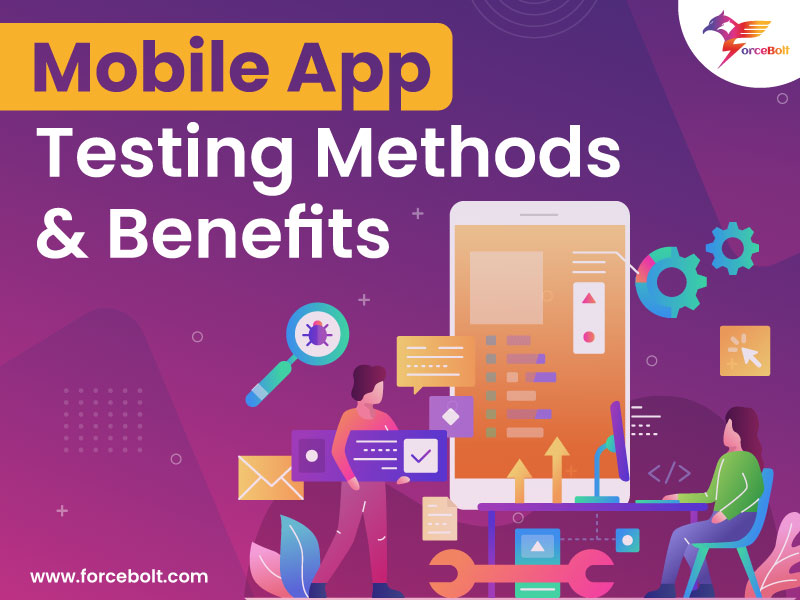Sharing is caring!
As a business owner, you might know that testing and quality assurance (QA) plays a vital role in mobile app development. End-to-end mobile app testing is a crucial stage that helps many app development companies deliver a high-quality product in a short period and ensures an excellent mobile experience, no matter what type of app you use.
The latest statistics highlight the importance of mobile app testing. According to 2022 statistics, out of 5 million mobile apps, 71% of app uninstalls are caused by annoying app crashes. More than 50% of downloaded apps remain unused. In addition, 70% of users leave their app because it takes up a lot of space, and 65% of users avoid using brands that offer a poor mobile experience.
Many app developers are struggling to release high-quality mobile applications into the market. Therefore, hiring a full-stack development company like ForceBolt will lead all phases of application development, from content development to project requirements analysis, building test specifications, and launching the finished products to ensure successful app development.
In this blog, we’ll cover everything you need to know about mobile app testing. If you are a novice or experienced app developer looking for the methods and benefits of mobile app testing to create a successful app, the guide is a must-read for you.
Table Of Contents
- What is Mobile App Testing?
- Testing of different Mobile Apps
- Latest Strategies & Trends In Mobile App Testing
- Types of Mobile App Testing
- Benefits Of Mobile App Testing
- How to choose the best Mobile App Testing Tools
What Is Mobile App Testing?
Mobile app testing is performed to identify design issues, performance bottlenecks, and app flaws. In addition, conducting effective testing of an app allows you to diminish issues, enhance the app’s quality, and deliver the best software possible by testing its usability, functionality, and consistency.
Mobile application testing eliminates various risks and increases your app retention rate. Therefore, companies need to choose the right mobile application testing tools to meet customers’ ever-increasing demands.
Types Of Mobile Apps That Requires Testing
- Native Apps: These apps are specially designed for Android or iOS mobile platforms and are usually downloaded and installed from Google Play Store or Apple App Store. This includes proprietary apps developed by Objective-C/Swift for iOS or Java/Kotlin for Android and cross-platform proprietary apps created using frameworks such as NativeScript, Flutter, and React Native.
- Hybrid Apps: It is a web app written with web technologies. The app runs in its container and uses its browser to serve HTML and process JS locally.
- Responsive Web Apps: This app is designed to be accessed via a mobile browser. Web apps can be progressive web apps (PWA) or responsive site versions that add useful additional features for mobile devices.
Latest Strategies & Trends In Mobile App Testing
- Perform Automation Testing – The brand ensures that the application’s main functions are working correctly by testing the application. It comprises functional and non-functional testing of an app.
It would be a tedious process to test this test package manually. Hence, you can switch to test automation and use various mobile app testing tools such as Espresso, Calabash, and Appium to increase efficiency and productivity.
- Implementing AI And ML In Testing – Mobile app testing is also gaining momentum as technology advances. You can find various AI and ML-based application testing tools in the market. AI improves in-app DevOps testing, which is especially useful for AI.
DevOps helps speed up testing automation by providing ongoing feedback and facilitating the rectification of bugs. The use of monitoring tools helps to retrieve feedback data. The tool uses machine learning to check for problems and make recommendations for improvement.
- Implementing CI/CD In Testing: You can seamlessly modify the module’s code and forward it to the apt branch in Continuous Integration and Continuous Delivery. This makes the testing process more systematic and efficient from the beginning. You can choose any CI/CD tool, e.g., B. Travis CI, Jira, Bamboo, Jenkins, and many more.
- Mobile App Testing In Cloud
Cloud testing for mobile apps can do wonders for your app development projects. First, it does not require any hardware to set up the device lab; you can test multiple devices simultaneously and add or remove devices as needed. As a virtual platform, the cloud platform helps test anywhere, anytime.
Types Of Mobile App Testing
- Functional Testing: Functional testing ensures that the application works correctly and adequately. This type of testing focuses on the primary purpose and flow of the app, ensuring that all of its features are working correctly and meet the desired specifications.
- Usability Testing – This testing tests usability and intuition to ensure a smooth, error-free, and anomaly-free user experience.
- Compatibility Testing – Compatibility testing is a type of non-functional testing that ensures your mobile apps run on different operating systems, devices and apps, network environments, and with specific internal hardware specifications.
- Performance and load testing – Performance tests check how well a mobile app performs under a given workload.
- Security Testing – This type of testing detects threats, vulnerabilities, and risks in applications and prevents malicious attacks from intruders. Security testing aims to identify all possible vulnerabilities and loopholes that can lead to loss of revenue, loss of information, etc.
- Installation Testing – Also known as implementation testing, installation testing is done to verify that software installs and uninstalls correctly.
- Manual Testing – Testing software manually without using automation tools is manual testing. In manual testing, the main goal is to identify bugs or errors and make the product error-free. Developers choose the type of testing approach to test specific features early in the product development phase.
- Automated Testing – After the complete development of an app, the testers automate the test scenario considering the end user’s perspective to test the app’s functionality, usability, and performance.
- Interruption Testing – It checks the application’s performance when it is interrupted by other applications.
- Design Testing – This ensures that the app is easy to use and maintains proper functionality, helping users stay engaged. For example, content should match the orientation and size of the device, which can make it easier for users to scroll.
Benefits Of Mobile App Testing
- Ensures Proper Functioning Of App – The main goal of the QA process is to ensure that the solution works smoothly. In addition, QA experts test whether users can successfully download the program on multiple devices. They use real devices to test apps that offer a software product that works well.
- Predicts Users’ Experience
The specialists put themselves in the shoes of the end-user and investigate the look and feel of an end product. They use the app to determine if their navigation is intuitive and logical. Additionally, it checks whether the use of the application is comfortable for the user of the application in different situations. In this way, they predict whether customers will prefer to use these apps or delete them from their phones.
- Increases Customer Loyalty
Ensuring ease of use and proper operation of the application enhances customer satisfaction. In this way, analytics helps reach a larger audience and boost the brand reputation.
- Higher Revenue
The testing process may require an initial investment but helps avoid troubleshooting and rebuilding a product later. It saves time, lowers overall costs, and allows fast time to market.
- Reduces Testing Time During Development Phase
Manual testing needs a significant amount of time and workforce. Quality analysts can perform multiple tests in a short period of time. The main advantage of automated testing is the increased speed and efficiency of the testing process.
- Reduces App Development Cost
Automated application testing can reduce application development project costs. Thorough testing is the main reason for cost savings. Launching an app with incorrect functionality can lead to poor user reviews, uninstalling the app, and a negative impression of your brand. So it is a must to test your app thoroughly from the start.
- Faster App Deployment
Automated testing with an agile development process helps develop applications quickly, which results in outstanding results and a higher return on investment. Automated testing shortens the application development lifecycle and results in faster application delivery.
What To Consider While Choosing Mobile App Testing Tools?
Supports multiple programming languages – Mobile apps can be developed in any programming language depending on price, requirements, and target audience.
However, choosing a mobile app testing tool that allows testers to write test cases in different programming languages is always good. According to a study by developers Stack Overflow, JavaScript is the most preferred programming language among developers with a 64.96% share, followed by HTML/CSS, Python, and others.
Seamless integration with CI/CD tools – Integrating third-party applications would help build a robust automation framework. For example, a good mobile application testing tool can be integrated with numerous third-party applications and CI/CD tools to assist in various purposes, including execution, revision control, test management, record defects, and inspection.
Provides no-code options for building and running test cases – Creating codeless tests is quick, easy, and ideal for non-programming users. With codeless mobile app testing tools, you can reduce its time to run iterative test cases.
Supports multiple operating systems – Ensure your mobile app testing tool you choose supports various operating systems, such as Android and iOS, if you are looking for a cost-effective and time-saving option.
Record & Play options – Mobile app testing tools should recognize, record, play, and automate each test scenario action in the mobile app development process.
Logs and report handling – Mobile app testing tools should log test reports containing detailed plans, screenshots, failure points, etc.
Final Wrap
As smartphone adoption increases, it’s critical to ensure a consistent app experience across devices. Nowadays, users expect high performance and smooth interaction making mobile app testing an integral part of your overall testing strategy. Testers must invest in appropriate mobile app testing tools to successfully launch applications and ensure an enhanced app experience.
Looking for the best Mobile App Developers to build performance-oriented user interfaces for modern rich applications? Get in touch with ForceBolt mobile app development experts who strive to deliver the project on time and invest their time to enhance their skills for developing powerful and efficient software as per your business requirements.

Akshay Dhiman
Chief Technical Officer
The Chief Operating Officer of ForceBolt and a decisive leader who possesses a wide array of technical skills and management skills to implement operational changes by working at different levels of development. Being enthusiastic and technology proficient, he understands the importance of staying up-to-date with the latest technological transformations and provides competitive, scalable and efficient solutions. He has a good command of technical language and possesses good communication skills. Being a leader makes him a good team player, and he resonates with his priorities well.













